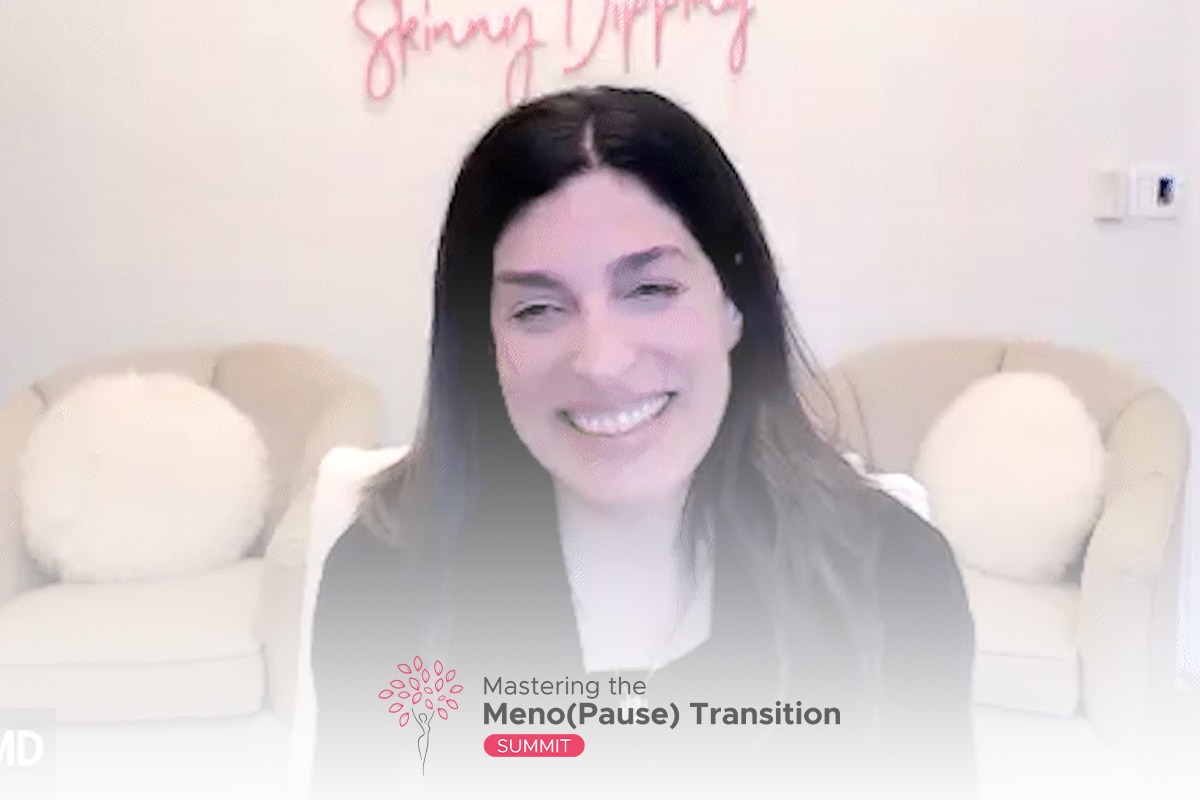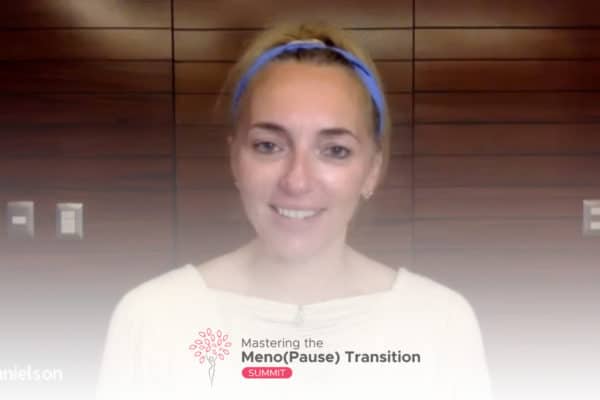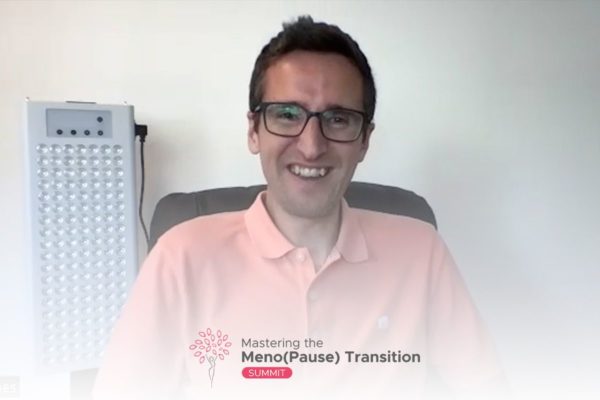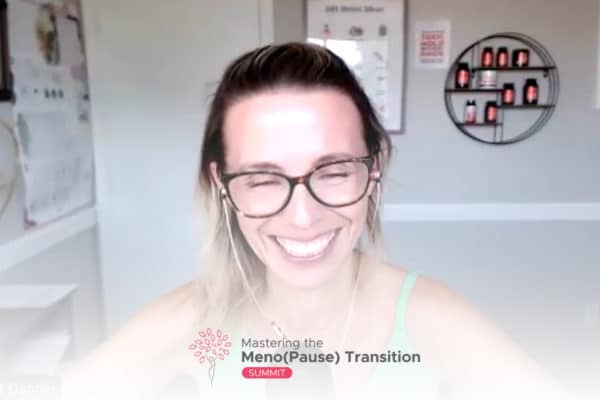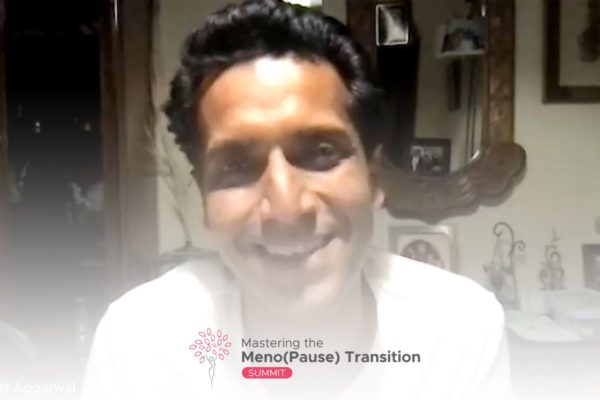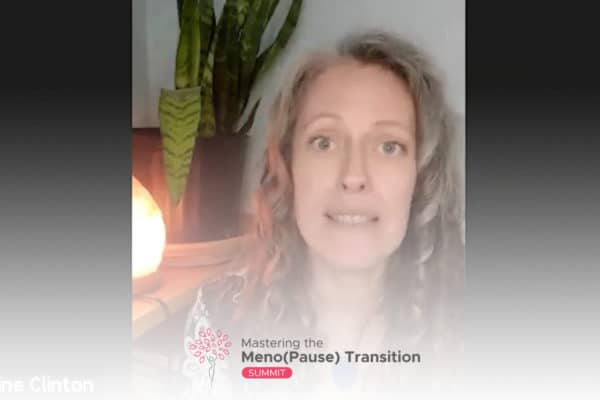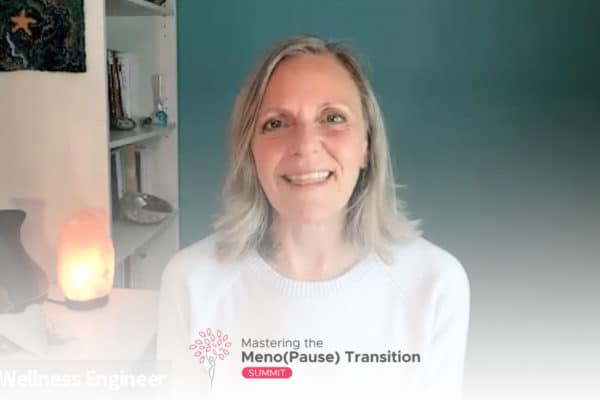Join the discussion below
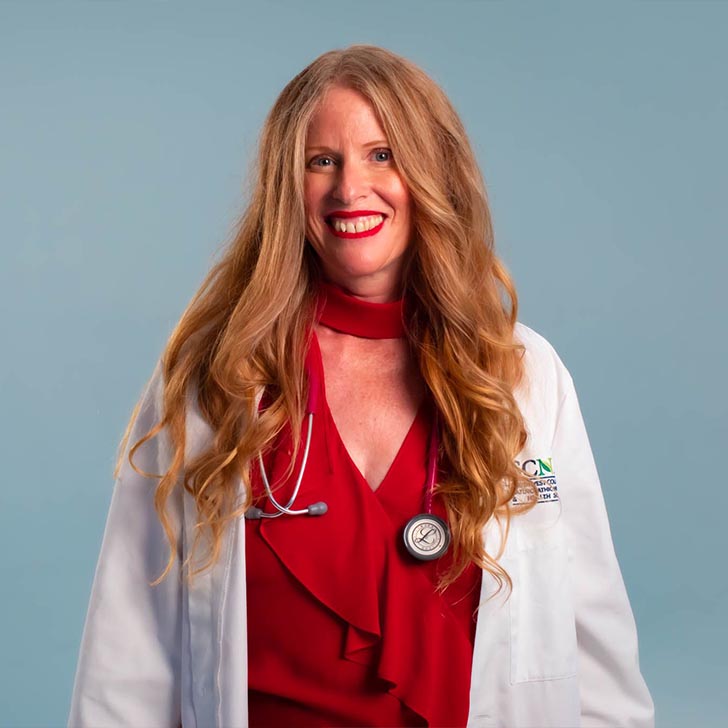
Dr. Sharon Stills, a licensed Naturopathic Medical Doctor with over two decades of dedicated service in transforming women’s health has been a guiding light for perimenopausal and menopausal women, empowering them to reinvent, explore, and rediscover their vitality and zest for life. Her pioneering RED Hot Sexy Meno(pause) Program encapsulates... Read More
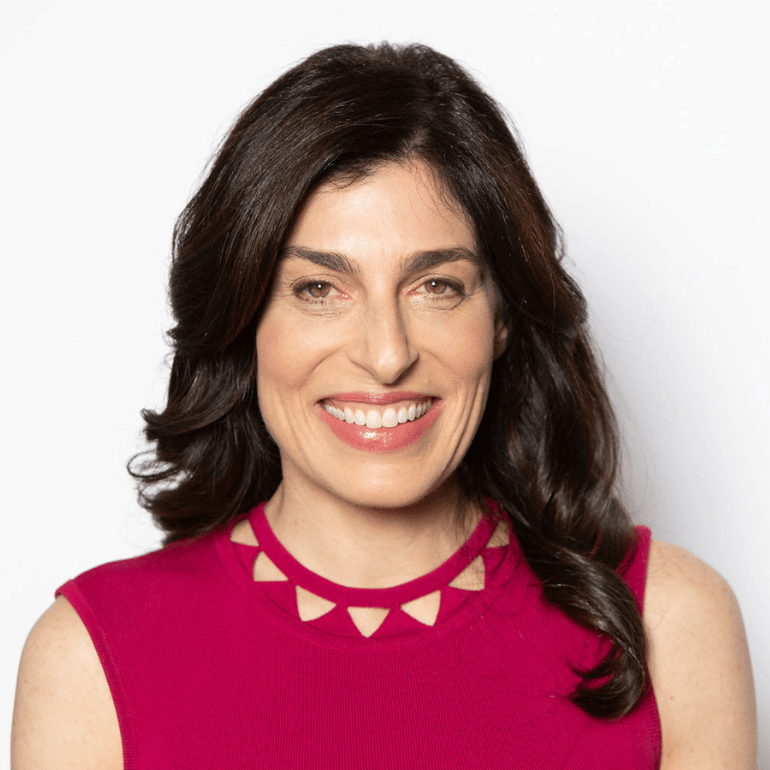
Blending science with soul, Dr. Keira Barr turns conventional methodologies on their heads so midlife women can feel comfortable in their bodies and love the skin they’re in Dr. Barr is a prominent leader in women’s medicine – creating a bridge between hormones, skin and mind-body medicine to optimize women’s... Read More
- Celebrate their strength and leverage their struggles as their superpower (learn how the neuroscience of celebration affects your hormones)
- Clarify their purpose (so they can get on with the work they’re here to do in the world)
- Identify the top subconscious beliefs, habits and conditions that hold you back
Dr. Sharon Stills
Hi, everyone. So good to see you here again. Welcome to the Mastering Menopause Transition Summit. I’m your host, Dr. Sharon Stills. It’s always a joy and an honor to be here with you, sharing all this amazing information. Today is gonna be another good one. I am so looking forward to the conversation we’re gonna have with my special guest, Dr. Keira Barr. She’s a mindfulness mentor. She’s an embodiment coach. She’s a dual board-certified dermatologist. She’s written a best-selling book called “The Skin Whisperer,” which I think is such a cool title. And so we are just gonna talk about your skin inside, outside, mindfulness, all my favorite topics. So thank you so much for being here. Welcome, welcome.
Dr. Keira Barr
Thank you. Thank you.
Dr. Sharon Stills
So I guess just for starters, you have such a vast and interesting resume of all that you do. So how did you go from being a dermatologist to getting into natural healing and mindfulness and all of these other things?
Dr. Keira Barr
Yeah, I’d like to say it was some lovely story, but I think for many of us, it’s like when poop hits the fan, stuff changes, right? Your mess becomes your mission. And so about a decade ago, the focus of my practice in dermatology was skin cancer and melanoma. And I was running ultramarathons at the time, thought I was the peak of health, and my skin was changing. I was developing new moles, pigment, lesions. They were darker. I was having biopsies every couple of months. They were more and more atypical until I found the one on my arm that I had a diagnosis of early melanoma. And that really was my wake-up call that how I was living wasn’t necessarily serving me. And from there, it was more gut issues and hormone issues, and my health just really spiraled out of control. Going to my traditional, Western-trained colleagues, I was just getting pills and other things that weren’t helping me.
And that’s what led me to integrative functional medicine and really understanding, connecting the dots for myself, that all of the issues that I was having, the underpinning was stress, and that our mind, our body, and our skin are so intimately connected. And that when we don’t feel comfortable in our skin, and for decades, I wasn’t, I’m still not at times, but when we don’t feel comfortable in our skin, it shows up in so many ways, including what we see on the surface. And so that really has led me to shifting the focus of the work that I do with embodiment and mindfulness, is really helping people use what they see on their skin as the greatest source of information to what’s happening beneath the surface so that they can be empowered to take control of the things they can control, like taking good care of our health and especially as we navigate through menopause, when a lot of things are changing.
Dr. Sharon Stills
I love that, just sitting here thinking about feeling comfortable in our skin ’cause I think as we’re going through perimenopause and menopause, it can be such a time where we don’t feel comfortable in our skin. Things are changing. And so I think that’s such an important thing to think of. So what would would you advise? What would you share for how do you learn to become comfortable in your skin?
Dr. Keira Barr
Yeah, it is not a one-and-done. That is for certain. And I think it’s understanding, especially, that what is showing up, especially in menopause. Hair may be thinning. Skin may be dry. There’s more fine lines, wrinkles, dark spots. You know, skin is dry everywhere, including our intimate bits, right? It’s information. Use your skin and what’s showing up on it as your greatest source of information and clues as to what your body may be asking from you, what your body may need. And so then you can begin the process of offering it, right? You may not know exactly what that is, but we know that there’s such a connection between our brain and our skin, derived from the same embryologic tissue, that there’s so much information that we can glean. The gut-skin connection. So breakouts and other things. So it’s really just, I would say, instead of listening to the beauty and cosmetic industry that we should be covering up, tucking, Botoxing, and filling to camouflage these changes that we’re seeing, I say embrace them and see what we can learn from them to help us, again, be empowered to live our best lives at this stage of life.
Dr. Sharon Stills
I love that. I love the embracing rather than suppressing ’cause aging, it’s inevitable and we all do it. And it’s actually a privilege to age and it’s a blessing to get to be alive to go through those processes. And as you were talking, I was thinking, is there anything in the body, any organ that really isn’t connected to the skin? Just seems like it’s all connected to the skin.
Dr. Keira Barr
Yeah. As our largest organ, I mean, your skin truly is a window to and reflection of our overall health and wellbeing. And there is a direct correlation between our brain and our skin. As I mentioned, derived from the same embryologic tissue, there’s a bidirectional communication. So especially when we’re talking about stress, right? So this is how it really played out for me and for so many of clients. Acne used to be something that we thought only teenagers got. There was this statistic. Someone was just saying, “It used to be many years ago, like in the teens, adults with acne. Now it’s in 40, 50% of adults.” And women who are in the perimenopausal, menopausal phase of life are struggling with breakouts. Stress is one of the contributing factors to stimulating those oil glands, which is one of the four pillars of what creates acne eruptions. And when you then, you have an acne eruption, then you’re looking in the mirror, and then you’re feeling stressed or shamed or feeling terrible.
And it creates this vicious loop because when we are stressed, our body produces primary stress hormones: cortisol, adrenaline. Cortisol and cortisol-releasing hormone directly stimulates the oil glands. Most people don’t know this. And so we always think of, when we think about stress, we think of a top-down process, that it’s the brain activating that hypothalamic-pituitary-adrenal axis and the sympathetic-adrenal-medullary axis, and then that sends signals and neurotransmitters and hormones all throughout the body. But what most people may not appreciate is that your skin has the exact same mechanism, that your skin produces stress hormones. So your skin becomes both a target and perceiver of stress. So it’s this two-way street. So it’s very fascinating that our skin is connected to every organ, but especially with regards to stress, it really shows up in so many different ways. Stress is kind of, I think, one of the biggest enemies of our skin because, especially as we are maturing, many women are concerned about fine lines and wrinkles. Well, cortisol, your primary stress hormone, contributes to breakdown of that collagen and the elastin, which gives our skin that youthful, plumpy appearance, and it also prevents its repair.
Dr. Sharon Stills
It’s always all roads home always lead to stress. I’ve said this in other interviews, but I always say stress is 99.9999999% of all imbalances we have. And it’s always about getting a handle on stress. And so I love that you’re tying it to the skin because so often, we don’t think about that. As you said, the skin is our largest organ, but a lot of times we even forget that the skin is actually an organ. We just think if it is something we see and it better look pretty.
Dr. Keira Barr
I mean, we cover with clothes or with makeup or what have you. Totally. We just ignore it. But to your point, the statistics do show that upwards of 90% of all doctor’s visits are for stress-related ailments. And skin issues are among the number one reasons people go to the doctors. So there is no denying that stress and skin are intimately connected. We know it on a practical level. We know it on a physiological level because of that connection. The skin and the brain are derived from the same embryologic tissue. So our skin isn’t just something that we adorn with clothes or makeup. It actually is your barrier between you and the external world. It is your greatest protector, your greatest ally in helping you take control of your health. Yeah.
Dr. Sharon Stills
So that’s really interesting. I didn’t know that such a high percentage of visits are because of skin, although it makes sense because we are so driven by what we see. And so we can’t really see our liver or the inflammation in our gut, and so we can kind of ignore it. But when you have something on your skin, you’re like, “Ooh, what is that, and why is it there, and how do I get rid of it?”
Dr. Keira Barr
Exactly. And what’s showing up on your skin can be clues about what may be happening with your liver and what may be happening in your gut, right? Because we know there’s a direct correlation between the gut and the skin. And there’s literature showing you acne, eczema, psoriasis, among a few. And what’s happening with our immune system and autoimmunity. Conditions like hair loss, alopecia, or vitiligo, loss of skin pigmentation. Your skin is this amazing, it can give you so much information if we’re willing to actually look at what we’re seeing and be really curious from, not from a place of judgment, truly from a place of curiosity, and not be so quick just to cover it up or camouflage it, thinking that there’s something wrong. Nothing has gone wrong. In fact, this is a gift. I know it it’s very not the party line and not what people think. And it can be challenging ’cause if you’re looking in the mirror and you’re like, “Ugh, what is going on? I’ve got a big date, I’ve got this. It’s making me feel awful about myself and affecting my self-image and my self-esteem.” And that may be true and I’m not trying to diminish any of that. And yet what you’re seeing, if you’re willing to really look, can offer you vital information that will help boost your confidence, your self-image, because you’re able to take control of the things that you can control. There’s lots we can’t control. That’s for sure.
Dr. Sharon Stills
So is there anything we could kind of take the ladies through now? Anything they could be looking at or looking at to kind of get some information while looking at their skin, while we’re listening to this talk?
Dr. Keira Barr
Yeah. So I mean, when it comes to menopause, right, we’re talking about the decline of our sex hormones. And so the one that we think of most commonly is estrogen. And estrogen plays a significant role in the health of our hair and our skin. So starting with our hair, some women may notice that as they’re going through menopause, that their hair may be a little thinner or finer, less dense. They might have a widening of their part. And it’s akin to male-pattern baldness, so we call it female-pattern baldness, androgenetic alopecia. And a lot of this has to do with the fact that estrogen plays a role in the hair growth cycle. So your hair grows in three phases: a growing phase, a resting phase, and a falling-out phase. And estrogen is responsible for the growth phase or prolonging that growth phase. That’s why when, for those who have been pregnant, they may have noticed during pregnancy that their hair was more full and lush as estrogen levels were elevated.
Once they had a baby and hormone levels were starting to come down kind of precipitously, they might have noticed a dramatic shedding. And they’re like, “Oh my God, I’m losing my hair. I’m gonna go bald.” Those women do not go bald, but it can be quite disconcerting. And that’s because when estrogen levels go down, it shifts the phase that your cycle is in to that resting and then falling-out phase. So you may notice, because you have less estrogen onboard, that the growth phase isn’t as prolonged. The other thing that estrogen does is it plays a significant role in production of hyaluronic acid. So what so many of us are paying thousands of dollars to get injected into our face estrogen produces naturally. So as we are going through the menopause transition and estrogen levels are declining, some women may notice that their skin isn’t as supple and full, that they’re noticing more fine lines and wrinkles and skin sag because of decreased production of hyaluronic acid, coupled with estrogen also plays a role in collagen production.
So it’s kind of like a double whammy there. So you don’t have the fullness of that moisture from the hyaluronic acid, which draws basically 1,000 times more water. So hyaluronic acid is very hydrophilic. And then you’re not producing as much collagen. So the fine lines, the wrinkles, we notice that. Dryness. Again, estrogen plays a significant role in skin hydration, in helping maintain the integrity of your skin barrier. So you might notice you’ve been using the same cosmetics for years, and all of a sudden, now your skin is a little bit more irritated and dry and red. And you can’t tolerate the same products because the pH of your skin has changed a little bit as the hydration status and the texture and turgor of your skin has changed as well. Vaginal dryness.
Sex being uncomfortable. Well, your vaginal tissue, it’s skin. And without the hyaluronic acid and the moisture and then the collagen, not the production being down, sex may be uncomfortable. There may be more friction. There can be atrophy in that area because of lack of collagen. So women may experience more urgency, frequency, and discomfort. So again, yes, everything is connected to the skin and the transitions in our hormones. It makes a lot of sense. If you’re experiencing these things all of a sudden, you’re not losing your mind. It’s because your body is naturally, the production is naturally going down. Do you have any questions? I’m babbling a lot, but I just wanted to circle back to hair for just one second.
Dr. Sharon Stills
Circle, circle.
Dr. Keira Barr
Okay. Okay. So I mentioned that you might notice that there is some hair shedding or hair thinning, but with regards to the widening of the part and more women feel like they’re going bald, there’s a reason for that, too. So as our hormones are declining, the first hormone to decline is progesterone, and then there’s estrogen and your androgen. So there’s a relative imbalance. And even though you might not have too much testosterone or androgens on board, relatively speaking, compared to the progesterone, it seems elevated. So what happens is testosterone comes in two forms, essentially: testosterone and dihydrotestosterone. Dihydrotestosterone is the more potent form, and that affects hair follicles.
Progesterone plays a role in blocking the conversion from testosterone to its more potent form, which is a good thing because without that inhibition, without progesterone on board, what happens is on your scalp, dihydrotestosterone can cause the hair follicles to shrink, what we call miniaturization. So the hair is more finer, thin. It doesn’t grow as much. So you might notice that the part is widening, that you have what looks like bald patches. The hair follicles are not scarred down. They’re capable of growing hair, it’s just that more potent form of testosterone is causing a change in the texture and turgor of the hair. On the face, it has the exact opposite. So women might be experiencing like, “I’m going bald. I’m growing a beard. What the F.” Right? And that’s because on the face, the dihydrotestosterone has the exact opposite effect. It stimulates hair growth. So if you’ve noticed that, those dark, coarse hairs, that’s part of. It’s the relative imbalance between your androgens and the progesterone and the estrogen.
Dr. Sharon Stills
I love that you brought that up and that you brought up DHT, ’cause that’s such an important one. I’ve had women come in who have been on hormones and maybe overdosed on testosterone. And no one was watching their DHT and their hair is falling out. And so that’s such an important marker. Make sure that you have your physician tracking that so that you know how you’re converting. Your testosterone is not causing all of these issues you were talking about. You know, acne breakouts from testosterone and all of these. When I talk about hormone replacement, it’s so vast and we so think of it for relief of symptoms, which is great. And so this is a way that you can really know by looking. And it can be motivating, if your skin or your hair… The truth is, we’re women and we wanna look in the mirror and feel good about what we see. And so this can be a really good, as you’re saying, feedback mechanism to know if you’re on the right hormones, if you need a change, if you’re on too much, too little. And so I love that. And I’m thinking I have to ask you, ’cause I’m sure women are curious and I’m curious, what’s your skincare routine? What do you recommend? Are there things to stay away from, things to look for? How do we get our skin to look like yours?
Dr. Keira Barr
Yeah. Well, I am not a skincare junkie. So when I was practicing dermatology, it was skin cancer melanoma, and then I was behind the microscope. So I am not up on all the latest, greatest things because it’s too overwhelming. I like to keep it really simple. Really, the key to glowing skin, it starts from the inside out. It absolutely does. It begins with how we nourish ourselves, not just with food, but with quality sleep. I think we underestimate. If I were to give a prescription, it would be for sleep and learning how to manage our minds and our stress ’cause it’s the two things that jack up hormonal imbalance between cortisol and melatonin. Cortisol, primary stress hormone, like I had mentioned, it breaks down the collagen and it prevents new collagen from forming.
Melatonin is one of the most potent antioxidants our body can produce to repair the DNA damage that has been done from the sun exposure, which causes 90% of visible signs of aging. So sleep is so vital, right? And so how we eat, how we move. Overexercising is, I think, for a lot of women, it’s a way of life because we’re trying to make ourselves smaller to fit into some beauty ideal, but learning how to move your body in a way that feels really good. Listen, I felt victim to that. I was running ultramarathons and ran myself right into the ground. Tore my hip and wound up with melanoma and hormone imbalances. So I don’t say this to judge anyone. I’m just saying, listen, listen to your body. Move your body in a way that feels really good.
Dr. Sharon Stills
We have a talk on here with Deb Atkinson, who is the exercise queen, and she gave us permission: Less is more. And so if you haven’t checked out that talk at, you’re gonna wanna check it out because I love that you brought that up and we are conditioned to think, oh, we gotta pound, pound, pound. So after I talked to her, I took the day off from exercising. It was awesome.
Dr. Keira Barr
Yeah. Yeah. Because the more we pound, and again, it’s a stress on the body. Eating can be a stress on the body. And we’re doing it multiple times a day. So it’s not just what we eat, but it’s the why and how we’re eating as well, right? What are we really hungry for? And giving ourselves permission to give that to ourselves, right? That’s part of how we manage the stressors and stress response in our body, because again, that’ll show up on your skin. Dark circles, fine lines. One hormone imbalance, it’s a cascade effect.
Dr. Sharon Stills
Exactly.
Dr. Keira Barr
So cortisol cause insulin. And blood sugar dysregulation can show up on your skin in so many different ways too, from weight gain to patches of thickening, darkening of skin called acanthosis nigricans. I mean, we could go on. Your skin is your greatest ally, your greatest asset, and your feedback mechanism of how you’re taking care of yourself, in many ways. So my personal skincare routine, if we’re just talking three steps, so it’s the foundational stuff. And I know in all your other talks, you probably dive deep into that. And I second all of it. Skincare from within, absolutely. And that’s really what the premise of my book, “The Skin Whisper,” is about, because again, I named it that because your skin and your body are sending you messages all of the time. And it’s our opportunity to listen to those messages when they are just a whisper rather than a shout, because, unfortunately, my skin was shouting at me with all the changing moles and then the melanoma. I was deaf to it. I don’t want that for anybody else.
So if we can pay attention, use what you see to your advantage, and approach our skin from a place of appreciation for what it it does and what it can tell us rather than contempt and criticism, game changer. To take care of your skin from the outside in. 90% of visible signs of aging are from sun exposure, so sun protection, sun protection, sun protection, sun protection is really, really important. And not just with SPF. People always say, “SPF is your BFF.” I say it’s one of your inner circle friends. Protective clothing, actually, is the number one way to protect yourself. Wide brim hat, sunglasses, covering your skin as much as you can. But three-step skincare routine: In the morning, cleanse your face. Gentle cleanser. Antioxidant serum to prepare your skin for the exposure you are going to get from the sun, from blue light sitting in front of your computer, and from environmental exposure. Air pollution is right behind UV exposure for causing hyperpigmentation and damaging your skin. So you want to protect the skin with an antioxidant serum. Vitamin C and E, at the very least, but there are other antioxidants and ingredients that can be in there as well, like niacinamide and others, Gotu kola.
But vitamin C and E are your primary ones. And together, they work the best. So it’s a synergistic effect of vitamin C and E together. Then, tinted moisturizer that has sunscreen SPF or 30 above every single day. And here’s what most people don’t know or appreciate: UVA rays, so the sun is comprised of UVA, UVB, and UVC. The UVC doesn’t get to the earth, so we don’t have to worry about that. But UVB are the burning rays. UVA are the aging rays. They are longer than UVB rays, they don’t fluctuate throughout the year, and they penetrate your window glass. So if you’re like me and you have your computer on your desk and you’re sitting in front of a window, you’re getting pounded by the sun all day long, whether you realize it or not. And 80% of UV rays come through clouds. So I live in the Pacific Northwest. It is cloudy all the dang time here. I’m still getting sun exposure. So you need to protect yourself every day. Then, sitting in front of the computer, you’re getting blue light exposure. And studies have been showing that blue light, from your devices, from your computer, from your phone, can break down your collagen and elastin and contribute to hyperpigmentation. So it’s the tint, the iron oxide tint in your moisturizer with sunscreen that is offering you protection from the blue light. So rain or shine, inside or outside, there are wonderful products that you can use that almost act as like your foundation.
So you don’t have to double duty. I use one that I love, that it’s very sheer, but it’s tinted and, you know. So three steps: cleanse, antioxidant serum, sunscreen in the morning. In the nighttime, it’s kind of rinse and repeat. Let’s just say you woke up late and you didn’t wash your face, you smeared on your antioxidant serum, and you only did two steps, antioxidant serum, sunscreen in the morning, great, go. In the evening, wash your face because of that air pollution and the smog that’s getting in the pores that’s gonna potentially contribute to hyperpigmentation and skin irritation things. So you definitely wanna wash your face at night. Step two, you can smear some more antioxidant serum on. And then step three would be using a product like a topical retinoid, a vitamin A derivative that helps with skin cell turnover, because our skin, as we are maturing, the magic number of skin cells migrate from the bottom of your epidermis, which is the very top layer of your skin, and there’s seven layers of your epidermis from the bottom layer to the top, and they shed. When we’re younger, that happens every 28 to 30 days.
As we are maturing, that cell cycle slows down, which is why you may notice that your appearance is more sallow, more dull. So a product like a topical retinoid will help facilitate that process. Topical retinoids can be a little bit irritating and drying for some people. They also can make you more sensitive to the sun the next day. Again, why you need some protection every day. But if you can’t tolerate a topical retinoid, products like bakuchiol are nice alternatives. And they’ve also been found to be safe in pregnancy. Whereas vitamin A, even though the amount you’re using on your skin is so small, when taken by mouth, vitamin A derivatives are category X. So we always say, if you’re pregnant don’t use it, although we’re all going through menopause and pregnancy really isn’t on the table at the moment. And there’s that one advantage. You have sex whenever you want, and you can use topical Retin-A, which is like the fountain-
Dr. Sharon Stills
Yay!
Dr. Keira Barr
of youth whenever you want. So there are some advantages to get.
Dr. Sharon Stills
We’re making a list of all the amazing things. My menopause is awesome. So you just added two important ones to it. I love it. I wanna switch gears, but before we do, I just have a few more skin questions. I’m curious as to what your thoughts are on Botox and facials and just some of these fillers. And I’d love to hear your thoughts on that.
Dr. Keira Barr
Yeah. Listen, I’m all for them. It’s all about intentionality, right? How we see ourselves, the why behind why we’re doing it, because this stuff ain’t cheap and it’s not a one-and-done. Botox is every three to four months. Filler is nine months, a year, sometimes longer. You’re lucky if it lasts that long. It’s expensive stuff. And so for me, it’s always about why. If I’m getting these things injected or these procedures done because I think, if I do them, then I’ll feel good about myself, then I’ll feel worthy, then I’ll feel attractive, the return on your investment is gonna be so small. You might feel good for a short period of time, and then you’re right back to where you were. But if you decide to do these procedures ’cause you have been nourishing yourself, you have asked yourself what you really need and you’ve given it to yourself, you’ve learned how to manage your stress, you are doing those things from a place of true self-care and self-love, that you feel really good and you want your outside to mirror your inside, hell yes, all day, every day.
That money is so well spent. And the studies, I support this too, because there are studies on Botox and depression. And listen, there’s nothing magic about Botox with depression. However, when you look in the mirror, if every time you look in the mirror, you’re scowling, and when you’re scowling, you just are saying nasty things to yourself and you’re beating yourself up and that inner critic is just, oh, she’s just having her way with you, with Botox, you paralyze those muscles. And when you look in the mirror, even if you want to scowl, you can’t and it softens the gaze. And it really does open up an opportunity to maybe have a kinder, gentler conversation with yourself. And so from that perspective, I do think that it can be valuable.
Dr. Sharon Stills
I love the way you think. It’s ’cause it’s the way I think, too. It’s just like, “Oh, I love what she’s saying. Guess I’ll stay the whole time.”
Dr. Keira Barr
And listen, I know this because I’ve beat the shit out of myself. I don’t say any of this stuff because I’m like, I’m up here and this is what you should do. It’s like, let me tell you. I overdieted, overexercised, beat the crap out of myself, and was miserable. Got skinny, did this, and I’m like, “Why is nothing different?” Because nothing changes if nothing changes. And we have to change and be willing, just really be willing to look, really look at ourselves and see what’s there. Yeah, and I look forward it and accept it, you know?
Dr. Sharon Stills
Yeah, I’ll share a personal tidbit here. Not skin, but breasts. And I’m a naturopathic physician. I’m all about natural. And I can swing sometimes, and then I remember to come back to balance. And I’ve always had huge breasts. So I breastfed and they always bothered me. Couldn’t exercise without them bouncing up. And I had a patient come in, this was years ago, and she had just had a breast reduction. And she was so happy. And I was like, “I wanna be happy like her.” And so I actually did. Even though surgery is not something I typically recommend, it was because of the why. It wasn’t because I needed to get a breast reduction to feel good about myself, but it was like, “I wanna feel good. I don’t wanna have my back pain and hunched over. I wanna be able to go out and not wear a bra, if I don’t want to.” And so I went and did it. And so it just reminded me, as you were talking, it’s because of the why. I didn’t do it so I would have perky boobs and feel sexy. I already felt sexy. I just wanted to feel more comfortable in my skin.
Dr. Keira Barr
Exactly, exactly. And so I feel like there’s so much judgment. First of all, we judge ourselves harsher than anybody. But with the social media messaging and as we are maturing, transitioning through menopause, I’m so grateful for COVID, I have to say, because it was during COVID with the embracing the gray. It seems like menopause companies are popping up all over the place and really fostering this conversation. Prior to this, women were invisible in beauty products, in personal care products, and in the media. We were. We were made to feel that we had passed our prime and we needed to be quiet. And I am so grateful that we are now shifting that paradigm, that it doesn’t have to be that way, right? And so I’m grateful for you having a summit like this so we can have these conversations and really illuminate that there is so much to celebrate. As shitty as it may feel with the hot flashes and the sleepless nights and maybe the weight gain and the mood swings and some of the things like that, but on the other side, there is a light, right? And it’s getting brighter.
Dr. Sharon Stills
I’m .
Dr. Keira Barr
And when our moms went through menopause, that just wasn’t the case, so.
Dr. Sharon Stills
Yes, it is. I call it the sacred second act ’cause it is a good one. So I have one more skin question-
Dr. Keira Barr
Yes.
Dr. Sharon Stills
And then we’ll talk about your embodiment practice. I keep saying that, but I keep going, “I have another one.” I’m just curious if there’s something you see more commonly in women this around this time. Do more women end up with psoriasis or melasma or eczema, or is there anything you’ve been? I don’t know if there is. I’m just curious. Is there anything you’ve correlated with as women, as they’re aging and going through the hormonal journey, that they end up manifesting on their skin more often?
Dr. Keira Barr
Yeah, I have to say, I stepped away from clinical practice, so I’m not managing women’s skin as much. But because I had alluded to the role that estrogen plays on skin hydration, a lot of dry skin and itchy, irritated skin are very common in women who are going through menopause. Hair changes. And then the fine lines, the wrinkles, and the discoloration of skin. So I think those are probably among the more common. Some women do experience acne. And they’re like, “What is going on? I am not a teenager, but I am breaking out.” And again, that’s where, really, stress can play a significant role and learning how to manage that, because again, that cortisol, it helps stimulate those oil glands contributing to acne. So it is kind of a gamut, but I would say dry, itchy, irritated skin is among one of the biggest complaints.
Dr. Sharon Stills
That makes sense. So let’s take a little turn here now. Embodiment coach. Tell us what that means. I love that word.
Dr. Keira Barr
Yeah, so it really is about being connected to your body. We talked about it earlier that we don’t think about our skin as like an organ or just something to cover up, but it’s a matter of being in your skin. Who are you being? How are you showing up in the world? So many of us, I mean, we use skin as a metaphor for everything. Getting under my skin. My skin is crawling. Uncomfortable in my skin. And so the process is really that experience of what is it like to live in my skin and through mindfulness, through meditation, through movement, really teaching women different skills of how to live more comfortably and confidently in their skin, especially as things are changing, especially as they may be juggling raising teens or kids leaving the home, but taking care of aging parents, of career transitions, of what is their relationship with their partner like as their body is changing. Maybe they are experiencing vaginal dryness and their libido is not where it was. How does that make you feel in this body of yours? Because that cognitive dissonance of what’s happening, what we think should be happening, but what’s really happening, does activate that stress response, making us feel even more uncomfortable in our skin, which can have that outward manifestation in so many different ways that I was describing. So teaching women practices, really learning how to be with the experience of what is uncomfortable, as it may be, sometimes, is essentially embodiment. It has other very formal definitions, but that’s how I would explain it.
Dr. Sharon Stills
I was gonna say, for someone who’s listening, who is learning all about what she can do and hormones and is gonna find a doctor who understands all of this and so forth, who doesn’t feel good, who feels fat or feels gray or feels dry, what could you share for her now? What is something she can learn to embody to start to shift that?
Dr. Keira Barr
I think, first and foremost, I always talk about the five A’s of the skinny dipping process. And the first is just bringing your awareness, right? How are you feeling? What is happening? Looking to see, like visually seeing, but also checking in with, right, how am I feeling about this? Most of us think that something has gone wrong if we’re feeling sad or frustrated or angry or irritable, but I would say, allow for that, right? Life is this 50/50. It’s not rainbows and daisies. And just because you go into menopause, all of a sudden, somehow it’s supposed to be different or better than it was. No, life was always this way, and I think we fight against the reality. So allowing for all the discomfort and knowing that you’re not broken, that nothing has gone wrong, and accepting that there is change that’s happening. Again, we can’t fight against it, but we can accept where we are and be able to take stock of what we see and how we’re feeling and be able to take empowered action from that place, right?
Dr. Sharon Stills
Right.
Dr. Keira Barr
Yeah, and you’re feeling you may be gaining some weight. Why is that? Right? What’s happening? Is it sleep. Right? We know that not sleeping well can add, it affects your ghrelin and your leptin and your cortisol and your insulin and all of those hormones that can add some weight around the middle, right? So again, it’s an opportunity to really just increase our self-awareness, allow for what’s here without trying to judge it or wanting it to be different, and accepting where we are as not something to be changed or fixed or nipped or tucked or cover up just to feel a certain way, but to help us move into this sacred second stage of life. So that’s a lot of it, but most of us are, we don’t know what’s happening.
We just feel tired and overwhelmed and stressed, and we think that there’s no other way. But honestly, in this past, during COVID over the last couple years, I dove into menopause medicine, prescribing bioidentical hormones. And I have to tell you, I’m a big fan. By the way, I take them myself. I think that there’s a place for them. But what I found, first and foremost, as I was giving hormones, and the women’s hormones were balanced on paper, and still so many of my clients felt stressed out, overwhelmed, weren’t sleeping, fighting with their partner, fighting with their kids. But when I was able to really bring their attention to what was happening, breathe with them, lead them through a meditation, help them reconnect to their body, that’s when the transformation happened. That’s when they started feeling well.
Dr. Sharon Stills
Amen.
Dr. Keira Barr
But we do all of it, but yeah.
Dr. Sharon Stills
The hormones is the easy part. It’s easy to give someone hormones and balance their hormones. And what you bring up is such a, it sounds so simple, but it can be challenging. But the wisdom is in us. We possess the brilliance and we possess the opportunity to really check in and know what’s going on with us. We just have to make space for it and remember the priority of how important that is. So thank you so much for bringing that to our attention. And you mentioned movement, so I’m just gonna bring that up. That’s not something you hear so commonly, so I’m just curious if there’s something you can share or just to educate us a little bit more on that.
Dr. Keira Barr
Well, I think it ties a little bit back to what we were talking about with moving your body, not in like a pushing, hard way, but movement can be medicine. And there’s so much literature. I am not a yoga teacher. I enjoy yoga, but that’s not even necessary. But there are studies linking yoga and the power that it has for healing trauma and the stress response and for your skin. Actually, there’s a really great study for yoga and decreasing the markers of inflammation. And they actually found that yoga decreased wrinkles. So plug for yoga for that, for your skincare. And again, it’s because of the decrease in that stress response. So movement, part of when we are feeling stressed and anxious and overwhelmed, we may feel like a lump in our throat, a pit in our stomach, energy in our chest, and it feels stuck and it feel stagnant. And wellness has become more of a trend and everyone’s meditating and you should just breathe, but sometimes that’s not getting the job done. And I have so many clients who tell me, “Listen, if you tell me to just sit down and meditate, I’m gonna punch you in the face.”
I’m like, “All right, that’s not the right tool that we need in your toolbox right now.” So we need to mobilize that energy and really come into our body. And it can be as simple as just like a gentle rocking. But it’s, again, just like you said, it’s tuning into what our body innately knows, that inner knowing, ’cause we’re so used to being told what to do, that someone knows better than us. The media is telling us that we must do x, y, or z. But when we actually give ourselves permission to just tap in, where am I feeling this energy? Does it have a texture? Does it have a color? What does this energy wanna do? And sometimes I do this. I’m not even consciously rocking. Like, it’s just happening. My energy just wants to move.
Dr. Sharon Stills
This also happened to me, too. I’m like, ooh.
Dr. Keira Barr
It’s so soothing, but sometimes the energy is gonna be like, I wanna move. And I’ll lead clients through sessions where we have pillows and we’re throwing things. And first rule is you can’t hurt yourself, you can’t hurt the room, but sometimes you need to just let it out or cry because we hold it in. We think we have to be strong or hide our emotion. But it’s such a release in a way that sometimes quiet sitting meditation just can’t do.
Dr. Sharon Stills
Yeah.
Dr. Keira Barr
Cry for our body.
Dr. Sharon Stills
When we cry, it’s like nature. We have cortisol releasing in our tears. When I feel myself at my desk and I feel like, oh, I’m getting a little anxious or tense, I’ll just throw on a song and I have my own personal dance party.
Dr. Keira Barr
Oh my God, I have a disco ball and my kids would always get so irritated. Like, Mom, what is that? I’m like, “Oh yeah. I have my own dance party. Shake my booty.” It’s like the best. It is. That is an instant reset. Instant reset. So yeah, you’ve gotta have your playlist and shake your groove thing and yeah.
Dr. Sharon Stills
That’s skin medicine. But I’m gonna play with the rocking ’cause as you said it, I started doing it. I was like, “Oh, it’s so soothing. It’s like rocking a baby and just rocking yourself and nurturing and loving your own little inner child.” You’re so kind.
Dr. Keira Barr
And then adding like a soothing self-touch, hand to your heart. But everyone is gonna be different. I noticed that I oftentimes do put my hand to my heart. And it’s a little bit of containment, you know? I can secure myself, give myself that safety and security. But I also find that I rub my hands against my thighs as a soothing. My daughter, since she was little, I never picked up on it, but she tugs at her ears. So again, it’s all about getting curious, getting to know yourself. You are automatically doing all of these things, right? Your skin and your body are whispering to you all the time. It’s our opportunity to clue in to what our body is designed, to keep us safe and alive. And we can leverage that if we actually pay attention. Like, oh, I noticed I do this when I’m stressed out. So that when you’re stressed out, you’re like, “Let me try that. Let me see if it actually helps.” You do it on purpose, right?
Dr. Sharon Stills
Right.
Dr. Keira Barr
You do it by design, not by default.
Dr. Sharon Stills
Yeah, I love that. I love that. Oh, what a beautiful invitation for everyone. And before we finish, ’cause unfortunately we are winding down, I’m like, “I could have this conversation forever,” I have to ask, let’s go skinny dipping.
Dr. Keira Barr
Yeah.
Dr. Sharon Stills
Taking off our clothes and jumping in the water, is there something with skin in that? What is that about ’cause I love-
Dr. Keira Barr
Absolutely. Yeah. So the whole premise behind that is when I was practicing dermatology, I had to get people naked physically in order to examine what was on the surface and teach them to look for what was on the surface in order to help them save their own life, because skin cancer and melanoma are the most prevalent cancer in our country and in places around the world. So we had to be willing to get naked physically to save our own life. This applies to getting naked mentally, emotionally, and spiritually as well. So if we want to truly thrive and live as the fullest expression of ourselves, that’s what’s required.
Dr. Sharon Stills
I love that. I want a “let’s go skinny dipping” sign behind me now. Wow.
Dr. Keira Barr
It’s not easy and it’s uncomfortable and it’s messy and all of that. And admittedly, I get naked, and then I put all my layers back on, and that’s just part of the process. Nothing has gone wrong, but it’s that awareness, right? Bringing our attention to what we’re doing helps us. You know, stop putting all the layers and just be okay. Nothing has gone wrong. And then, again, just gently. Maybe it’s a finger. Maybe it’s just showing just a little bit at a time. You don’t have to go all in all at once.
Dr. Sharon Stills
Biggest gift, right, is paying attention moment by moment on purpose to your life.
Dr. Keira Barr
Mm-hmm.
Dr. Sharon Stills
Hack into it. So this has been a joy. And I think you have a free gift for everyone.
Dr. Keira Barr
Yeah. So what we were talking about, paying attention with intention, without judging, because stress plays such a key role in creating havoc in all areas of our life, but especially for our skin, I created a five-day mindset reset experience where, in less than 10 minutes a day, you can be guided through meditations to help you feel more at ease, more calm, and more comfortable in your skin. So I wanted to make sure that everyone had a few tools in their toolkit to get started.
Dr. Sharon Stills
That’s cool. Thank you, thank you. That sounds fantastic. So thank you for coming on and just sharing your beauty and your message and your wisdom with all the ladies. My heart just feels open after talking to you, so I’m sure everyone is.
Dr. Keira Barr
Thank you.
Dr. Sharon Stills
Feeling the glow. I’m feeling the inner glow.
Dr. Keira Barr
Yeah, it’s like the natural, the glow from the inside out. Doesn’t cost a thing.
Dr. Sharon Stills
Yeah, beautiful.
Dr. Keira Barr
Oh, that’s the thing. I’m sorry. The average American woman spends upwards of $250,000 on her parents in her lifetime. That’s a shit ton of money. We just did it for free.
Dr. Sharon Stills
Outward glow. Thank you. Thank you, everyone. This is gonna be one you’re gonna wanna listen to time and time again and just get into your heart and get into your rocking. So we’ll be back with another great talk soon. Be well till then.
Downloads

